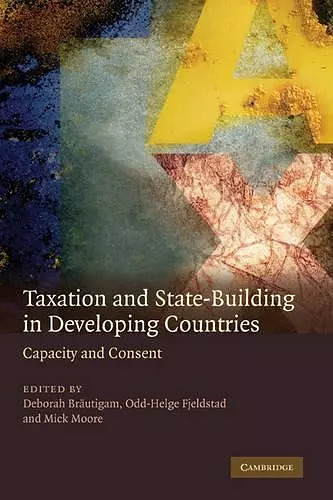Taxation and State-Building in Developing Countries
Capacity and Consent
Mick Moore editor Odd-Helge Fjeldstad editor Deborah Brautigam editor
Format:Paperback
Publisher:Cambridge University Press
Published:10th Jan '08
Currently unavailable, and unfortunately no date known when it will be back
This paperback is available in another edition too:
- Hardback£61.00(9780521888158)

Explains why taxation is a vital topic in explaining weak government in the poorer world.
There is a widespread concern about governments which are unable to exercise effective authority. This book explains why taxation is a vital topic in explaining weak government in the poorer world, and provides a wide variety of cases from Africa, Asia, Eastern Europe and Latin America.There is a widespread concern that, in some parts of the world, governments are unable to exercise effective authority. When governments fail, more sinister forces thrive: warlords, arms smugglers, narcotics enterprises, kidnap gangs, terrorist networks, armed militias. Why do governments fail? This book explores an old idea that has returned to prominence: that authority, effectiveness, accountability and responsiveness is closely related to the ways in which governments are financed. It matters that governments tax their citizens rather than live from oil revenues and foreign aid, and it matters how they tax them. Taxation stimulates demands for representation, and an effective revenue authority is the central pillar of state capacity. Using case studies from Africa, Asia, Eastern Europe and Latin America, this book presents and evaluates these arguments, updates theories derived from European history in the light of conditions in contemporary poorer countries, and draws conclusions for policy-makers.
'This book does a masterful job of clarifying the centrality of taxation as a means to build both states and societies. Its analytic contribution is significant. It also offers an excellent set of case studies that demonstrate how government can improve revenue raising while also promoting the general welfare of the polity. The neat combination of theory and cases ensures that this exciting collective endeavor will shape both scholarship and policy-making for years to come.' Margaret Levi, University of Washington
'The news is in: how much and how states tax their populations makes a tremendous difference to how well those populations live. And more taxes can actually coincide with better lives. In a series of well crafted studies, Brautigam, Moore and Fjeldstad show exactly how taxation - from coercive to contractual - makes a difference to national well being.' Charles Tilly, Columbia University
'Ranging across continents and political regimes, Brautigam, Fjeldstad, Moore and their colleagues provide lucid, dispassionate analysis of one of the most crucial issues in the contemporary political economy of development. Taxes are the cornerstone of any modern society, but for poor countries the capacity to tax can be the difference between chaos and development. This book skillfully dissects the ways in which global models have failed to serve the interests of poor countries and provides careful suggestions as to what actually works. Policy-makers and scholars alike should be grateful to have such a well-crafted, finely-balanced contribution to a topic too often mired in polemic and ideology.' Peter Evans, University of California, Berkeley
ISBN: 9780521716192
Dimensions: 227mm x 152mm x 18mm
Weight: 490g
308 pages